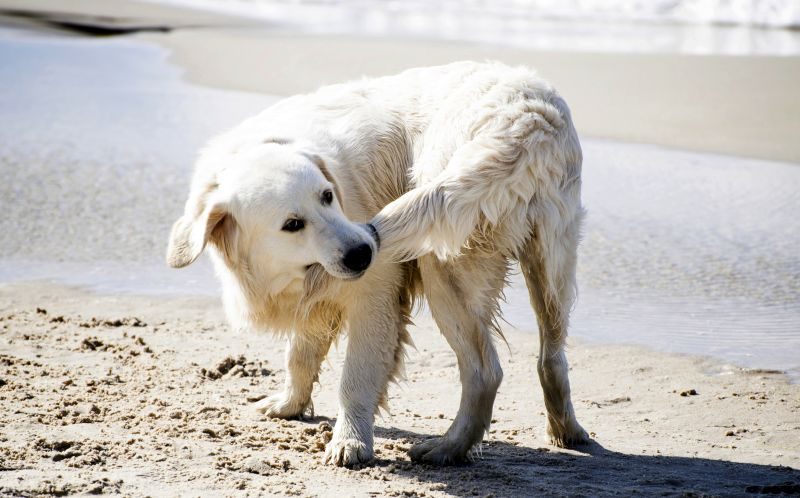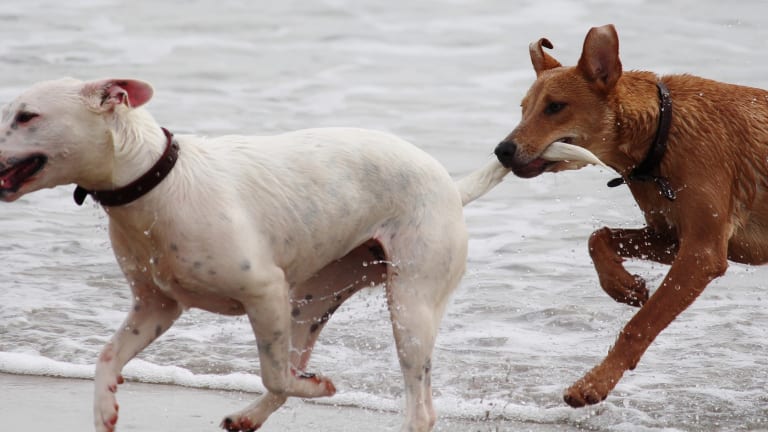
Watching a dog chase her tail is undeniably entertaining but when she does it constantly it can get worrisome. If tail chasing is a regular part of your dogs day you can take steps to help your dog.

An obsessive dog suffering from separation anxiety may chase his tail to help calm himself while his owner is gone.
Is it ok for my dog to chase its tail. Trauma to the tail or spine. Although its not always obvious at first a dog who chews their tail may have internal damage in their tail or spine. In other instances a dog biting their tail may.
People believe that tail chasing is an autistic behavior therefore they make the connection that vaccinations cause tail chasing which is not true If your dog is obsessively chasing his tail. Oftentimes dogs will chase their tails because they are a bit bored. Its a way for them to have fun and expend some energy.
This is especially true for puppies who may not even realize that their tail is actually a part of their body but see it as a toy. When a dog feels anxious they may chase their tail. Its not uncommon for dogs to have anxiety especially separation anxiety.
There are all kinds of behavior modifications to help those anxious pups. If you feel your dog chases their tail when they feel anxious contact your veterinarian for a behavior consult. An obsessive dog suffering from separation anxiety may chase his tail to help calm himself while his owner is gone.
Or your dog may chase his tail when he feels overcome with anxiety when a stranger approaches the house or during a loud thunderstorm. If your dog starts to chase the tail or even bite it this could also be a sign of other discomforts such as underlying medical conditions. They will often continue to chew at an irritated or painful area.
If your pup has their tail caught in a door or another problem they could continue to chew and chase the tail to suit their injury. When your dog starts to mess with its tail distract it with play or a 10 to 15 minute training session. 2 Give your dog a high-fiber diet to prevent impacted anal glands.
A high-fiber diet will help make your dogs stool more solid which will press on its anal glands. If the tail biting behavior is related to boredom or stress you may be able to identify your dogs triggers. For example some dogs may chew their tails when theyre crated or in response to a distressing stimulus like a doorbell ringing.
Provide your dog with safe toys to chew on. Dogs who chase their tails often do so from anxiety overexcitement boredom or an underlying medical problem. Some dogs such as German shepherds and bull terriers are more prone to tail-chasing behavior.
If tail chasing is a regular part of your dogs day you can take steps to help your dog. Here are a few reasons dogs chase their tails. Oftentimes dogs will chase their tails because they are a bit bored.
Its a way for them to have fun and expend some energy. This is especially true for puppies who may not even realize that their tail is actually a part of their body but see it as a toy. Simply train your dog to chase his own tail and he can have all the limelight when these moments come around.
Theres also the added bonus that this type of training will make it easier to train him to do a range of other things from heel to stay. If your dog chooses to pursue its tail over any other activity then forgoing the opportunity to eat play or chase a ball you may have a problem on your hands. Obsessive Compulsive Disorder in dogs is not a direct concern but our pets can grow obsessed with particular patterns of behavior.
This could explain why your dog is so determined. Dogs might chase their tails if it theyre infected or irritated by fleas or ticks. The severity of the problem can vary quite a bit depending on what exactly is wrong.
Dogs can also chase their tails as a compulsive behavior. A dog chasing its tail may be a sign of a direr issue. Like humans dogs can suffer from a form of obsessive-compulsive disorder called canine compulsive di.
Although most people consider a dog to chase its tail for fun the reason is not always that. Recently my cousin took her dog to the vet and surprisingly there are many other reasons why dogs have this behavior. If the animal is experiencing pain in the tail or anal region it is normal.
Watching a dog chase her tail is undeniably entertaining but when she does it constantly it can get worrisome. Some dogs with anal gland problems flea allergic dermatitis or other medical issues have been known to chase their rear ends. Sometimes albeit uncommonly tail-chasing is a sign of obsessive compulsive disorder.